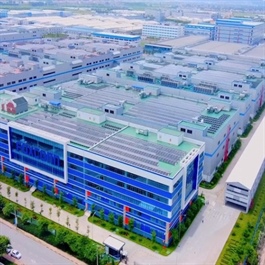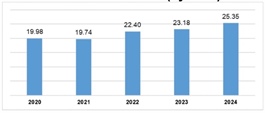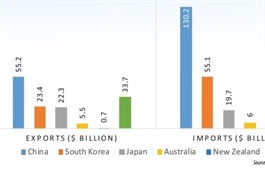Benefits ahead for both Vietnam and and UK through latter’s CPTPP addition
Benefits ahead for both Vietnam and and UK through latter’s CPTPP addition
Ample business prospects are available for British businesses in Vietnam with the United Kingdom now a member of the Comprehensive and Progressive Agreement for Trans-Pacific Partnership. Denzel Eades, chairman of the British Chamber of Commerce (BritCham), shared with VIR’s Thanh Van about how the deal opens up a host of new opportunities.

Denzel Eades, chairman of the British Chamber of Commerce (BritCham) |
Businesses across the UK will enjoy lower tariffs when selling to Comprehensive and Progressive Agreement for Trans-Pacific Partnership (CPTPP) member countries. How do you see it unlocking opportunities for UK businesses to increase their footprint?
The CPTPP creates a host of new opportunities for UK businesses to expand their footprint in Vietnam by reducing trade barriers and cutting tariffs. With fewer restrictions on market access, they can now compete more effectively in key sectors within Vietnam, particularly in industries where the demand for high-quality goods and services is rising.
For instance, consumer goods, technology, and machinery will see immediate gains, as the CPTPP provides a more favourable trading environment for these sectors. This allows British businesses to offer competitive pricing, improve supply chain efficiency, and more easily establish partnerships with local Vietnamese firms.
Moreover, Vietnam’s strategic location as a gateway to the broader ASEAN region positions it as a highly attractive destination for UK companies looking to expand their presence in Asia. The agreement’s provisions on investment, intellectual property, and service sector liberalisation offer them new opportunities to invest in Vietnam, especially in areas like renewable energy, infrastructure, and financial services.
In addition, Vietnam’s ongoing digital transformation and commitment to sustainable development open the door for UK businesses to introduce innovative solutions in emerging fields such as AI, fintech, and green technology.
The CPTPP’s framework for regulatory cooperation and market access provides them with a stable and transparent environment to explore these high-growth opportunities, positioning them as key players in Vietnam’s long-term development.
In short, the CPTPP enables UK businesses to operate in a more open and competitive Vietnamese market, which not only strengthens their presence but also promotes long-term economic collaboration between the two nations.
What are the key sectors of the UK and Vietnam to benefit from the CPTPP membership?
The UK’s accession to the CPTPP brings significant benefits to key sectors in both the UK and Vietnam. Traditional sectors like financial services, manufacturing, and food and drink are set to see immediate gains through reduced tariffs and streamlined regulations. Manufacturing, particularly in automotive parts, electronics, and machinery, will benefit from stronger supply chains. Additionally, the food and beverage sector will thrive as demand for high-quality British products in Vietnam continues to grow.
Beyond these, emerging fields such as AI, semiconductors, renewable energy, digital infrastructure, and education offer immense potential. Vietnam’s digital transformation and focus on a knowledge-based economy make it an attractive destination for British investors. AI aligns with Vietnam’s goals to develop smart cities and drive innovation in sectors like healthcare and education.
UK financial institutions will also benefit from enhanced access to Vietnam’s growing banking and insurance sectors. BritCham and the British Embassy to Vietnam are supporting CPTPP efforts, particularly via initiatives such as CityUK’s work on Vietnam’s international financial centre. The education sector is poised for growth as demand for quality education increases, providing opportunities for British universities and training providers.
The semiconductor industry also holds promise, with the UK’s technological expertise helping to boost Vietnam’s capabilities. Meanwhile, green technologies and renewable energy sectors align with Vietnam’s commitment to sustainability, attracting British investment in solar, wind, and other renewable sources.
BritCham plays a key role in facilitating these developments. Through various working groups on energy, and education, and environmental, social, and governance criteria, and with plans to expand into sectors like tech, professional services, and trade, BritCham is supporting businesses in Vietnam’s high-growth sectors.
How do you see the interest and preparation of the UK businesses to penetrate Vietnam as a CPTPP member market?
Such businesses are increasingly interested in entering Vietnam, drawn by the country’s economic growth, rising consumer demand, and strategic location in Southeast Asia. The CPTPP enhances this appeal by providing a clear trade framework, reducing tariffs, and simplifying market access.
Key sectors, including manufacturing, consumer goods, financial services, and digital transformation are particularly attractive. Many companies from the UK are forming local partnerships, investing in supply chains, and tailoring their offerings to the Vietnamese market. BritCham supports these efforts by providing market insights, networking, and connections. Additionally, the UK’s Department for Business and Trade helps UK businesses navigate the local landscape.
British businesses are focusing on understanding market dynamics, ensuring compliance with regulations, and identifying opportunities in high-tech manufacturing, renewable energy, and digital infrastructure. They are building relationships with Vietnamese government agencies and industry leaders to establish a long-term presence.
With the CPTPP providing a stable and predictable environment, UK businesses are committed to long-term investment in Vietnam, adapting to local practices and consumer preferences. Through BritCham’s trade services and network, they are well-positioned to build lasting partnerships and succeed in the dynamic Vietnamese market.
Do you expect Vietnam will welcome an increase of investments from UK businesses large and small?
Yes, and there are several reasons for this. Firstly, Vietnam’s inclusion in the CPTPP, along with its robust economic growth and strategic location, makes it an attractive destination for foreign investment. For UK businesses, Vietnam offers access not only to its dynamic domestic market but also serves as a gateway to the wider ASEAN region, a fast-growing economic bloc.
The CPTPP’s reduced tariffs, streamlined regulations, and enhanced protection for investments make it easier for UK companies to enter and operate in Vietnam with greater confidence.
Secondly, Vietnam’s commitment to digital transformation and sustainable development aligns well with the strengths of British businesses, particularly in sectors such as renewable energy, digital infrastructure, and advanced manufacturing. Large corporations are likely to be drawn to Vietnam’s growing demand for high-tech solutions and sustainable practices, especially as the country works towards its net-zero goals. This creates opportunities for British firms to bring their expertise in these areas and contribute to Vietnam’s modernisation efforts.
For UK small- and medium-sized enterprises, the CPTPP provides an important platform to tap into Vietnam’s expanding middle class and its increasing demand for high-quality consumer goods, services, and technologies. The agreement’s provisions on market access and regulatory cooperation reduce entry barriers, making it more feasible for smaller businesses to establish a foothold in Vietnam. Additionally, sectors like education, healthcare, and creative industries are ripe for smaller British firms to offer niche products and services that cater to Vietnam’s evolving needs.



























